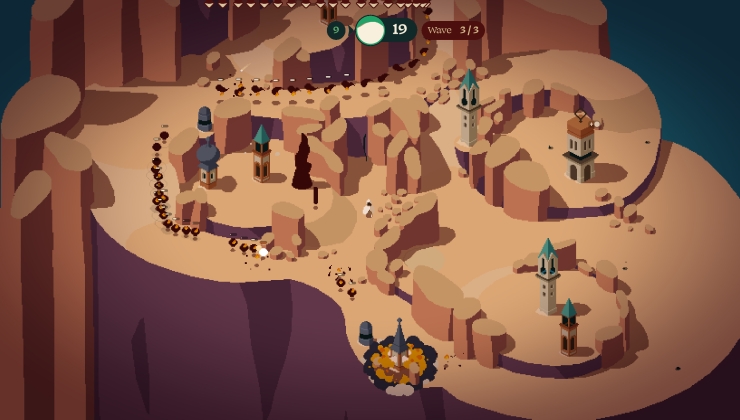We're seeing more reports of Steam for Chromebooks coming and Luke Short writing for Android Police thinks it will be soon. This would be a long time coming, after we've seen hints of it appearing for over a year now.
It won't be particularly helpful for a lot of the lower-end devices, but Chromebooks have been steadily getting bigger storage drives, with newer processors too that are much more capable. The new system that makes all this work is named Borealis, and it appears that as of November 29 it gained new "flags" regarding a Beta mode and a way to disabled "ChromeOS-specific integrations for the borealis client".
Not only that, there's also an earlier one from November 24 that mentions Borealis gained "support for Proton and SLR versions in Borealis game reports". Based on that wording, it appears they might have their own game compatibility database, which could end up looking something perhaps like Deck Verified for the Steam Deck.
Since Chrome OS is a Gentoo Linux-based operating system, it's another way that might help push up the Linux numbers on Steam. Although, it's possible Valve might tag it specifically as it's own thing since it's not really a "normal" Linux distribution, regardless, it will be running Linux native games and Windows games through Proton so it will still help Linux gaming as a whole.
google is struggling to sell stadia, so steam is quite important for chromebook gamers, google will have to work harder on making sure steam work flawless on chromebooks (aka, make sure their sandbox for linux native apps dont have any major flaw) if they want to enter the operating system market.
Aside from the Steam Deck, it's probably the other big Linux initiative that could push Linux adoption, imo. The Borealis "container" was (last time I checked) an Ubuntu VM, so it still helps getting games running on Linux, even if you are not a fan of Google.
Thing is, Chromebooks have a much bigger audience than Linux desktop. So, let's wait and see what kind of Chromebooks will be available for that kind of use-case and if there is a lot of interrest for gaming in the Chromebook user pool (or if it will draw new gamers to the platform).
Last edited by Mohandevir on 3 Dec 2021 at 2:32 pm UTC
that make things... interesting.
google is struggling to sell stadia, so steam is quite important for chromebook gamers, google will have to work harder on making sure steam work flawless on chromebooks (aka, make sure their sandbox for linux native apps dont have any major flaw) if they want to enter the operating system market.
Now imagine if Stadia would have gotten the publishers to publish the native Linux version of the games running on Stadia how much easier it would be for Google to have some games on their Chromebooks right now :-)
So who feels like they're only going ahead with this because Stadia is failing?that make things... interesting.
google is struggling to sell stadia, so steam is quite important for chromebook gamers, google will have to work harder on making sure steam work flawless on chromebooks (aka, make sure their sandbox for linux native apps dont have any major flaw) if they want to enter the operating system market.
Now imagine if Stadia would have gotten the publishers to publish the native Linux version of the games running on Stadia how much easier it would be for Google to have some games on their Chromebooks right now :-)
So who feels like they're only going ahead with this because Stadia is failing?that make things... interesting.
google is struggling to sell stadia, so steam is quite important for chromebook gamers, google will have to work harder on making sure steam work flawless on chromebooks (aka, make sure their sandbox for linux native apps dont have any major flaw) if they want to enter the operating system market.
Now imagine if Stadia would have gotten the publishers to publish the native Linux version of the games running on Stadia how much easier it would be for Google to have some games on their Chromebooks right now :-)
Maybe, but the Borealis project was started a while ago... Even before Stadia's official release, if my memory doesn't fail me... It might be a factor explaining why they are giving up that quickly on Stadia, though.
Last edited by Mohandevir on 3 Dec 2021 at 5:06 pm UTC
I just figure if Stadia had really taken off they would likely have let this wither on the vine. It's a fallback. One they knew they might need, so they made overtures and started plans, but if Stadia meant they didn't need this I suspect their first preference would have been to do a kind of Apple-but-in-the-cloud thing, controlling the whole experience end to end . . . and incidentally, not depending on the little Chromebooks' actual on-board capabilities as much.So who feels like they're only going ahead with this because Stadia is failing?
Maybe, but the Borealis project was started a while ago... Even before Stadia's official release, if my memory doesn't fail me... It might be a factor explaining why they are giving up that quickly on Stadia, though.
Last edited by mr-victory on 3 Dec 2021 at 6:41 pm UTC
Last edited by StalePopcorn on 3 Dec 2021 at 7:42 pm UTC
Side news; I turned our old Acer C720p Chromebook into a Linux laptop.I've thought about trying that with my wife's old Chromebook, but it looks pretty tricky.
I wouldn't mind particularly, if telemetry was something that they permitted you to switch off - but they don't. They force it on you, and other than stop using their services or hardware, you are unable to prevent it.
- I'm using de-Googled, LineageOS (AOSP) mobile instead of Google Services Android. (No location tracking, etc)
- I don't have working Amazon Echo, Google Home devices running in my home.
- I've stopped using Google Search and instead use Startpage and Duckduckgo. (And they're working fine for my searches.)
- I own no Apple devices, so no issue with Apple spying on me.
- I do own a Chromebook, which I instantly overwrote with Linux.
- I use OpenWRT router with DNS-based Ad-Blocking (which stops Google Analytics on every site I visit, plus other trackers)
- I never link web registrations back to Google or Facebook accounts. (Usually I link to throwaway email address.)
- On my Firefox browser I run uBlock Origin as my primary advert/tracker blocker, as well as other privacy extensions.
I find it frankly disgusting that these companies sell you devices, i.e. You purchase something and you become the owner of that item, and they keep controlling the device and forcing their will upon you. If I buy a phone from Apple or Google (or Samsung or whomever) I expect full control of that device, i.e. The ability to fully switch off telemetry within the software.
- I'm using de-Googled, LineageOS (AOSP) mobile instead of Google Services Android. (No location tracking, etc)I have you beat there. I don't own a cell phone. Mostly 'cause I'm cheap, secondarily because I like being alone when I'm alone, not so much because of privacy concerns.
- I'm using de-Googled, LineageOS (AOSP) mobile instead of Google Services Android. (No location tracking, etc)I have you beat there. I don't own a cell phone. Mostly 'cause I'm cheap, secondarily because I like being alone when I'm alone, not so much because of privacy concerns.
I respectfully disagree with you - My compromise is that I have "Most of the tech" with nearly all my privacy intact. If I were to go with your solution I'd gain a tiny amount of privacy, but lose out on technological benefits.
To expand a little, a de-Googled phone has no services running which are able to track you - It is Open Source, just like Linux (all the source code available, you can review it and compile it yourself). Pretty much the only tracking which is going on is your cellular provider able to perform inaccurate cell-tower triangulation (typically 500m circle). And the cellular provider's location-tracking (of my mobile sim) isn't anywhere near as concerning to me as Google's AI-enhanced profiling.
I just figure if Stadia had really taken off they would likely have let this wither on the vine. It's a fallback. One they knew they might need, so they made overtures and started plans, but if Stadia meant they didn't need this I suspect their first preference would have been to do a kind of Apple-but-in-the-cloud thing, controlling the whole experience end to end . . . and incidentally, not depending on the little Chromebooks' actual on-board capabilities as much.So who feels like they're only going ahead with this because Stadia is failing?
Maybe, but the Borealis project was started a while ago... Even before Stadia's official release, if my memory doesn't fail me... It might be a factor explaining why they are giving up that quickly on Stadia, though.
wich make a hell lot of sense, chromebook main advantage is the price, but if you need an expensive hardware to game on, then this advantage go out of the window, the same goes for stadia.
if stadia were sucessfull valve could capitalize in an market of cheap devices that windows simply cant, nor with microsoft charging for their licences, it would be a win win situation for google.
people complain that stadia games dont run on desktop native, but if we think about it, if google paid to port to any* distro, then they would spend millions of dollars for the port of each game, and may make almost 0 on return of investment because people may purchase their games on steam etc instead, no one is paid to be impartial, what valve is doing is alost an miracle.
How much demand is there for Steam on ChromeOS/Chromebooks? I don’t think there is much (I expect it is way less than %1.16 linux market share on Steam) as the main purpose of these devices is browsing the web. And these devices are often managed by schools/organisations.
i dont know but they were selling a lot of games for the educational market, it was the first machine of a lot of people since it was dirty cheap and their parents could afford, the lack of games didndt shy the parents who purchased so their kids could study, if google could make those kids play on their chromebooks, their first machine could as well "be the last", but they cant.
i cant wait for the ARM future, but i'm still skeptical, especially when it comes to legacy and emulators.
I don't like giving any money to google...









 How to set, change and reset your SteamOS / Steam Deck desktop sudo password
How to set, change and reset your SteamOS / Steam Deck desktop sudo password How to set up Decky Loader on Steam Deck / SteamOS for easy plugins
How to set up Decky Loader on Steam Deck / SteamOS for easy plugins
See more from me